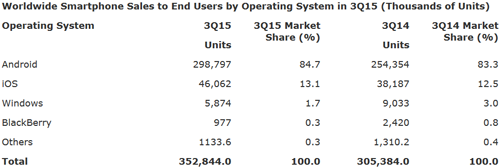News
Microsoft Looks To Shake Up Mobile Strategy
Microsoft is looking to refocus its mobile efforts in the wake of poor consumer sales numbers.
According to the latest figures from research firm Gartner, Microsoft is an increasingly distant third-place contender in the worldwide smartphone market, vastly trailing Google Android and Apple iOS. In the third quarter of 2015, Windows-based smartphones accounted for just 1.7 percent of the worldwide market, down year-over-year from an already low 3.0 percent. Of the roughly 353 million smartphone devices that shipped in Q3, Windows Phone ran on less than 6 million, compared to over 9 million in the same period last year.
Meanwhile, market leader Android accounted for 84.7 percent of the market, a marginal increase year-over-year, and shipped on nearly 300 million units. Second-place iOS had market share of 13.1 percent, up from 12.5 percent in the year-ago period, and shipped on 46 million devices.
Once again, Microsoft's mobile platform has been shut out of the overall booming smartphone market, which grew by 15.5 percent year-over-year worldwide.
 [Click on image for larger view.] Source: Gartner
[Click on image for larger view.] Source: Gartner
Notably, it has also missed out on the growth in emerging markets, where smartphone sales grew by 18.4 percent, compared to just 8.2 percent in mature markets. Microsoft had once sought to promote Windows Phone in emerging markets -- traditionally the domain of low-cost Android devices -- by expanding Windows Phone's language support, reducing hardware requirements, recruiting local hardware partners, and introducing lower price points. So far, however, those efforts have not translated to higher market share.
Nor will Microsoft be much helped by the upcoming launch of Windows 10 Mobile, according to Gartner. The new OS is expected to roll out to existing Windows Phone users in December, but the first new devices with Windows 10 Mobile pre-installed will hit retail shelves this week.
"Despite the announcement of Windows 10, we expect Windows smartphone market share will continue to be a small portion of the overall smartphone OS market as consumers remain attracted by competing ecosystems," said Gartner research director Roberta Cozza in a prepared statement. "Microsoft smartphones will mainly focus on driving value for enterprise users."
Speaking at the UBS Global Technology Broker Conference on Tuesday, Microsoft CFO Amy Hood echoed the notion that enterprises -- not emerging markets or entry-level users -- represent Microsoft's best chance at mobile success. She added that Windows Phone enthusiasts are also a target market. Microsoft has "focused" its mobile device portfolio to reflect this approach, she said.
"We launched a [Lumia] 950 and a 950 XL," Hood said, referring to Microsoft's new Windows 10 Mobile flagships that cost $550 and $650, respectively. "They're premium products, at the premium end of the market, made for Windows fans. And we'll have a business phone, as well. It's a focused approach. I think we're not focused on what that growth will look like and should look like. We're focused on doing it in a smart way. And we're focused on the people who love our products and our experience."
Of course, Microsoft's high-end focus pits it against Apple, whose iPhone 6 and 6 Plus devices dominated the premium market this past quarter, according to Gartner. However, Hood pointed to examples Microsoft's cross-platform mobile strategy as signs of its competitiveness. These examples include Microsoft's acquisitions of Sunrise Atelier, 6Wunderkinder and Acompli, makers of multi-platform mobile productivity apps that Microsoft has incorporated into its own mobile Office apps.
"If the mobility of the experience is important, then we'll probably be in that segment, in the phone, which is a premium in the business segment," she said.
Hood emphasized that Microsoft's focus is on "mobility" through the development of cross-platform apps -- not necessarily on growing its mobile market share.
"It's very funny, all the articles that have come out on how we own more of your iPhone space than we used to on your mobile phone," she said. "It's because of these beautiful experiences that we've put together that are accruing back to Office. It's a very good thing to have people want to use your app. That is what we mean by 'mobile-first.' It doesn't have to mean we sell a phone. Let me be super clear on that."